|
|
|
Sort Order |
|
|
|
Items / Page
|
|
|
|
|
|
|
| Srl | Item |
| 1 |
ID:
170461


|
|
|
|
|
| Summary/Abstract |
Although American leadership of NATO had been a constant over the entire postwar period, after the Soviet threat evaporated in the 1990s Americans began a process of reassessing the necessity and desirability of this leadership as well as the American return on its investment in NATO. Europeans, in turn, enjoyed a policy emancipation allowing them to follow the U.S. lead, resist (or reject) it when American policies violated European interests or, as a precautionary measure in the event of American abandonment, acquire strategic autonomy within the European Union. The persistence and credibility of American leadership of NATO after Kosovo, as well as episodic European challenges within and outside NATO, cannot be understood without reference to the structural and institutional factors preventing the American abdication of its leadership role within NATO or the European ability to reject it unconditionally. I find that material conditions for American leadership remain unimpaired, but the credibility of American leadership as it pertains to the confidence the allies have in U.S. willingness to fulfill its Article 5 commitment has suffered potentially irreversible damage. Yet it is institutional factors, particularly the institutional stickiness bonding the American foreign policy elite to a NATO-centric security system and the positive externalities attending institutional negentropy, that have played an outsized role in maintaining NATO’s cohesion and legitimacy. They have also raised the cost of substituting European strategic autonomy for American leadership or the abandonment of it. The Europeans have sought a precautionary defense autonomy to cope with non–Article 5 threats of peripheral interest to the United States but they have remained willing to follow the American lead on matters touching collective defense and deterrence in Europe. Future American grand strategy, currently undergoing vigorous debate inside and outside government, will have a fundamental impact on NATO’s centrality to U.S. foreign policy calculations as well as the desirability or necessity of U.S. leadership, independent of a European desire for or acquisition of strategic autonomy. The choice of strategy poses the greatest threat to NATO’s long-term cohesion, American willingness to remain entangled in European affairs, and American leadership in Europe.
|
|
|
|
|
|
|
|
|
|
|
|
|
|
|
|
| 2 |
ID:
061076


|
|
|
| 3 |
ID:
120834
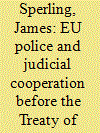

|
|
|
|
|
| Publication |
2013.
|
| Summary/Abstract |
Three key questions arise from the encroachment of the European Union (EU) on national prerogatives in the administration of justice: What factors contribute to the weakest link collective action problem attending police and judicial cooperation within the EU? What were the substantive and institutional goals of the EU in this policy domain? What accounts for the rising level of police and judicial cooperation despite the persistence of barriers to cooperation and incentives to defect? This article first establishes the fundamental incentives and obstacles to cooperation in matters of transnational security threats in post-Westphalian Europe. It then proceeds to explore the evolution of police and judicial cooperation in Justice and Home Affairs between 1999 and 2009, to assess national contributions to police and judicial cooperation, and to consider the potential impact that the changes introduced by the Lisbon Treaty, Stockholm Programme and European Investigation Order. A final question is considered in the conclusion: Did the level and extent of police and judicial cooperation that emerged between 1999 and 2009 give rise to a community of practice that in turn fostered a nascent community of identity resilient enough to mitigate the weakest link technology of public goods production endemic to this policy domain?
|
|
|
|
|
|
|
|
|
|
|
|
|
|
|
|
| 4 |
ID:
108665
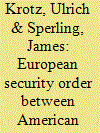

|
|
|
|
|
| Publication |
2011.
|
| Summary/Abstract |
We investigate the impact of historically rooted domestic constructions of purpose and ambition on the patterns of discord and collaboration in the Franco-American relationship over the course of the postwar and post-cold war periods. We stress the importance and tenacity of domestic historical constructions for explaining and understanding the foreign policy strategies that would otherwise confound a power-based analysis. The Franco-American bilateral relationship, in particular, illustrates the persistence and tenacity of each nation's historically constructed foreign policy conception during the bipolar distribution of power during the cold war and the contested unipolarity of the post-cold war era. We conclude with an assessment of the salience and relevance of domestic elements of foreign policy role and purpose for explaining and understanding how their bilateral relationship has affected the European security order into the second decade of the twenty-first century.
|
|
|
|
|
|
|
|
|
|
|
|
|
|
|
|
| 5 |
ID:
092903
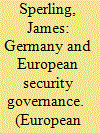

|
|
|
|
|
| Publication |
2009.
|
| Summary/Abstract |
The expansion of the security agenda after the end of the Cold War, propelled by the blowback of 11 September 2001, raises questions about the German ability and willingness to contribute to the regional and global security governance tasks facing Europe and Germany's continuing fidelity to its post-war European avocation. It also calls for a reconsideration of the Birmingham model of foreign policy analysis, particularly its emphasis on (and interpretation of) the ideational and institutional factors defining the German foreign policy agenda and shaping German foreign policy behaviour, at least with respect to the implementation (rather than formulation) of European Union security policies. Towards assessing the continuing utility of the Birmingham model, this article proceeds in three steps: the presentation of the Birmingham model and its restatement as six conjectures; a discussion of the security governance functions undertaken by the EU and the collective action problem facing Europe (and Germany) in executing them; and an empirical investigation of Germany's contribution to the EU as a security actor since 1990.
|
|
|
|
|
|
|
|
|
|
|
|
|
|
|
|
| 6 |
ID:
077649
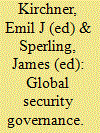

|
|
|
|
|
| Publication |
London, Routledge, 2007.
|
| Description |
xviii, 290p.
|
| Standard Number |
9780415391610
|
|
|
|
|
|
|
|
|
|
|
|
Copies: C:1/I:0,R:0,Q:0
Circulation
| Accession# | Call# | Current Location | Status | Policy | Location |
| 052348 | 355.033/KIR 052348 | Main | On Shelf | General | |
|
|
|
|
| 7 |
ID:
047370
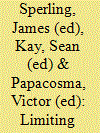

|
|
|
|
|
| Publication |
Manchester, Manchester University Press, 2003.
|
| Description |
xiv, 290p.
|
| Standard Number |
0719066050
|
|
|
|
|
|
|
|
|
|
|
|
Copies: C:1/I:0,R:0,Q:0
Circulation
| Accession# | Call# | Current Location | Status | Policy | Location |
| 047092 | 355.033047/SPE 047092 | Main | On Shelf | General | |
|
|
|
|
| 8 |
ID:
102365
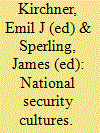

|
|
|
|
|
| Publication |
London, Routledge, 2010.
|
| Description |
xxviii, 308p.
|
| Standard Number |
9780415777421, hbk
|
|
|
|
|
|
|
|
|
|
|
|
Copies: C:1/I:0,R:0,Q:0
Circulation
| Accession# | Call# | Current Location | Status | Policy | Location |
| 055794 | 355.033/KIR 055794 | Main | On Shelf | General | |
|
|
|
|
| 9 |
ID:
088646


|
|
|
|
|
| Publication |
2009.
|
| Summary/Abstract |
NATO has throughout its history been the subject of prognostications of crisis and dissolution. Indeed, the alliance has been written off so many times that crisis as normality has come to typify its development. In the twenty-year history of NATO's post-Cold War development, Operation Allied Force stands midway between the existential moment that was the collapse of the Soviet bloc and the current travails being experienced in Afghanistan. A comparison of NATO's experience in the Balkans and in the Afghan theatre suggests that the view of a NATO perched permanently at the edge of collapse is problematic and misleading. This is not to defend alliance actions as such but rather to suggest that the narrative of crisis and collapse makes for poor analysis and underestimates NATO's proclivity for adaptation and endurance.
|
|
|
|
|
|
|
|
|
|
|
|
|
|
|
|
| 10 |
ID:
151569


|
|
|
|
|
| Summary/Abstract |
In securitisation theory (ST) little attention has been paid to how actors undertake securitisation collectively. The empirical focus of that theory has also, paradoxically, neglected the military-strategic sector and with it regional security organisations like NATO. Such an oversight is worth correcting for three reasons. First, NATO is constantly engaged in securitisation across a range of issues, a process that reflects an underappreciated recursive interaction between the Alliance and its member states. Second, the Ukraine crisis has resulted in Russia being explicitly identified as a source of threat and so has triggered a successful collective (re)securitisation by the Alliance. Third, a framework that demonstrates NATO’s standing as a securitising actor has potential relevance to other regional security organisations. This article discusses and amends ST in service of an approach that permits securitisation by actors other than the state, in this case NATO. A model of collective securitisation is presented and then applied empirically to the post-Cold War desecuritisation of Russia and its subsequent resecuritisation following the annexation of Crimea. The implications of resecuritisation for the emergence of a self-reinforcing security dilemma in NATO-Russia relations are also considered.
|
|
|
|
|
|
|
|
|
|
|
|
|
|
|
|
| 11 |
ID:
114739


|
|
|
|
|
| Publication |
2012.
|
| Summary/Abstract |
Afghanistan has provided NATO with its severest test of the post-Cold War period. The Alliance has set the end of 2014 as the target date for a withdrawal from combat operations and the consolidation of an Afghan lead in security provision throughout the country. It is an open question as to what the security situation will be once that crossroad is reached, but observation of progress since 2001 suggests that a lingering military stalemate is likely to persist unless and until a comprehensive political settlement is reached. NATO's ISAF operation has not, itself, had a mandate to affect a political solution, although its multiple efforts clearly impinge upon that goal. Meanwhile, NATO's operational mandate has proven extremely difficult to discharge. The Alliance has demonstrated a degree of flexibility in pursuing its mission, but has encountered a range of insurmountable obstacles - local, national and regional in origin.
|
|
|
|
|
|
|
|
|
|
|
|
|
|
|
|
| 12 |
ID:
128233
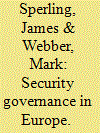

|
|
|
|
|
| Publication |
2014.
|
| Summary/Abstract |
The security governance literature has developed in four waves: the first is dedicated to matters of definition; the second to conceptual debate; the third to matters of application in the European setting and the fourth to how well the concept works in extra-European regions and at the global level. For all this effort, security governance as a concept remains problematic: it still has some way to go before it obtains clear definitional precision, conceptual clarity and a secure standing as concept in Security Studies. We address some of the theoretical and methodological difficulties common to the literature and argue that security governance has become overly preoccupied with agency and has thereby neglected structure. It has, in other words, obtained an actor-centered focus and so tended to conflate security governance as an analytical category with the specific actions of security actors. It has thus moved forward little in its ability to determine how and why security actors behave in the aggregate and whether that behavior reflects wider systemic properties. We thus ask in a third section whether it is worth returning to systemic thinking on security governance especially in the European context where the concept has had its most sophisticated application.
|
|
|
|
|
|
|
|
|
|
|
|
|
|
|
|
| 13 |
ID:
164991
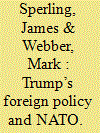

|
|
|
|
|
| Summary/Abstract |
Donald Trump assumed office in January 2017, committed to revamping US foreign policy and putting ‘America First’. The clear implication was that long-held international commitments would be sidelined where, in Trump’s view, the American interest was not being served. NATO, in the crosshairs of this approach, has managed to ride out much of the criticism Trump has levelled against it. Written off as ‘obsolete’ by the American president, it has fared better in the Trump era than many commentators had predicted. NATO exemplifies a tendency in US foreign policy, which pre-dates Trump, where open criticism stops short of abandonment. This pattern has continued since 2017 and indicates a preference for voice over exit. As such, it suggests that Trump’s foreign policy is not always as illogical as many have assumed. Logic is borne of institutional context: Trump has chosen to articulate voice where institutionalisation makes exit unviable. Institutional resilience in general and NATO’s case specifically has a wider relevance, both for transatlantic relations and international order.
|
|
|
|
|
|
|
|
|
|
|
|
|
|
|
|
| 14 |
ID:
046909


|
|
|
|
|
| Publication |
Manchester, Manchester University Press, 1999.
|
| Description |
xiv, 219p.
|
| Standard Number |
0719054028
|
|
|
|
|
|
|
|
|
|
|
|
Copies: C:1/I:0,R:0,Q:0
Circulation
| Accession# | Call# | Current Location | Status | Policy | Location |
| 044116 | 341.242/SPE 044116 | Main | On Shelf | General | |
|
|
|
|
|
|
|
|
|